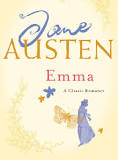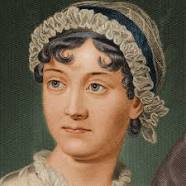Emma Page #28
Emma, by Jane Austen, is a novel about youthful hubris and the perils of misconstrued romance. The story takes place in the fictional village of Highbury and the surrounding estates of Hartfield, Randalls, and Donwell Abbey and involves the relationships among individuals in those locations consisting of "3 or 4 families in a country village". The novel was first published in December 1815 while the author was alive, with its title page listing a publication date of 1816. As in her other novels, Austen explores the concerns and difficulties of genteel women living in Georgian–Regency England; she also creates a lively comedy of manners among her characters and depicts issues of marriage, gender, age, and social status.
Mr. Woodhouse was rather agitated by such harsh reflections on his friend Perry, to whom he had, in fact, though unconsciously, been attributing many of his own feelings and expressions;--but the soothing attentions of his daughters gradually removed the present evil, and the immediate alertness of one brother, and better recollections of the other, prevented any renewal of it. CHAPTER XIII There could hardly be a happier creature in the world than Mrs. John Knightley, in this short visit to Hartfield, going about every morning among her old acquaintance with her five children, and talking over what she had done every evening with her father and sister. She had nothing to wish otherwise, but that the days did not pass so swiftly. It was a delightful visit;--perfect, in being much too short. In general their evenings were less engaged with friends than their mornings; but one complete dinner engagement, and out of the house too, there was no avoiding, though at Christmas. Mr. Weston would take no denial; they must all dine at Randalls one day;--even Mr. Woodhouse was persuaded to think it a possible thing in preference to a division of the party. How they were all to be conveyed, he would have made a difficulty if he could, but as his son and daughter's carriage and horses were actually at Hartfield, he was not able to make more than a simple question on that head; it hardly amounted to a doubt; nor did it occupy Emma long to convince him that they might in one of the carriages find room for Harriet also. Harriet, Mr. Elton, and Mr. Knightley, their own especial set, were the only persons invited to meet them;--the hours were to be early, as well as the numbers few; Mr. Woodhouse's habits and inclination being consulted in every thing. The evening before this great event (for it was a very great event that Mr. Woodhouse should dine out, on the 24th of December) had been spent by Harriet at Hartfield, and she had gone home so much indisposed with a cold, that, but for her own earnest wish of being nursed by Mrs. Goddard, Emma could not have allowed her to leave the house. Emma called on her the next day, and found her doom already signed with regard to Randalls. She was very feverish and had a bad sore throat: Mrs. Goddard was full of care and affection, Mr. Perry was talked of, and Harriet herself was too ill and low to resist the authority which excluded her from this delightful engagement, though she could not speak of her loss without many tears. Emma sat with her as long as she could, to attend her in Mrs. Goddard's unavoidable absences, and raise her spirits by representing how much Mr. Elton's would be depressed when he knew her state; and left her at last tolerably comfortable, in the sweet dependence of his having a most comfortless visit, and of their all missing her very much. She had not advanced many yards from Mrs. Goddard's door, when she was met by Mr. Elton himself, evidently coming towards it, and as they walked on slowly together in conversation about the invalid--of whom he, on the rumour of considerable illness, had been going to inquire, that he might carry some report of her to Hartfield--they were overtaken by Mr. John Knightley returning from the daily visit to Donwell, with his two eldest boys, whose healthy, glowing faces shewed all the benefit of a country run, and seemed to ensure a quick despatch of the roast mutton and rice pudding they were hastening home for. They joined company and proceeded together. Emma was just describing the nature of her friend's complaint;--“a throat very much inflamed, with a great deal of heat about her, a quick, low pulse, &c. and she was sorry to find from Mrs. Goddard that Harriet was liable to very bad sore-throats, and had often alarmed her with them.” Mr. Elton looked all alarm on the occasion, as he exclaimed, “A sore-throat!--I hope not infectious. I hope not of a putrid infectious sort. Has Perry seen her? Indeed you should take care of yourself as well as of your friend. Let me entreat you to run no risks. Why does not Perry see her?” Emma, who was not really at all frightened herself, tranquillised this excess of apprehension by assurances of Mrs. Goddard's experience and care; but as there must still remain a degree of uneasiness which she could not wish to reason away, which she would rather feed and assist than not, she added soon afterwards--as if quite another subject, “It is so cold, so very cold--and looks and feels so very much like snow, that if it were to any other place or with any other party, I should really try not to go out to-day--and dissuade my father from venturing; but as he has made up his mind, and does not seem to feel the cold himself, I do not like to interfere, as I know it would be so great a disappointment to Mr. and Mrs. Weston. But, upon my word, Mr. Elton, in your case, I should certainly excuse myself. You appear to me a little hoarse already, and when you consider what demand of voice and what fatigues to-morrow will bring, I think it would be no more than common prudence to stay at home and take care of yourself to-night.” Mr. Elton looked as if he did not very well know what answer to make; which was exactly the case; for though very much gratified by the kind care of such a fair lady, and not liking to resist any advice of her's, he had not really the least inclination to give up the visit;--but Emma, too eager and busy in her own previous conceptions and views to hear him impartially, or see him with clear vision, was very well satisfied with his muttering acknowledgment of its being “very cold, certainly very cold,” and walked on, rejoicing in having extricated him from Randalls, and secured him the power of sending to inquire after Harriet every hour of the evening. “You do quite right,” said she;--“we will make your apologies to Mr. and Mrs. Weston.” But hardly had she so spoken, when she found her brother was civilly offering a seat in his carriage, if the weather were Mr. Elton's only objection, and Mr. Elton actually accepting the offer with much prompt satisfaction. It was a done thing; Mr. Elton was to go, and never had his broad handsome face expressed more pleasure than at this moment; never had his smile been stronger, nor his eyes more exulting than when he next looked at her. “Well,” said she to herself, “this is most strange!--After I had got him off so well, to chuse to go into company, and leave Harriet ill behind!--Most strange indeed!--But there is, I believe, in many men, especially single men, such an inclination--such a passion for dining out--a dinner engagement is so high in the class of their pleasures, their employments, their dignities, almost their duties, that any thing gives way to it--and this must be the case with Mr. Elton; a most valuable, amiable, pleasing young man undoubtedly, and very much in love with Harriet; but still, he cannot refuse an invitation, he must dine out wherever he is asked. What a strange thing love is! he can see ready wit in Harriet, but will not dine alone for her.”
Translation
Translate and read this book in other languages:
Select another language:
- - Select -
- 简体中文 (Chinese - Simplified)
- 繁體中文 (Chinese - Traditional)
- Español (Spanish)
- Esperanto (Esperanto)
- 日本語 (Japanese)
- Português (Portuguese)
- Deutsch (German)
- العربية (Arabic)
- Français (French)
- Русский (Russian)
- ಕನ್ನಡ (Kannada)
- 한국어 (Korean)
- עברית (Hebrew)
- Gaeilge (Irish)
- Українська (Ukrainian)
- اردو (Urdu)
- Magyar (Hungarian)
- मानक हिन्दी (Hindi)
- Indonesia (Indonesian)
- Italiano (Italian)
- தமிழ் (Tamil)
- Türkçe (Turkish)
- తెలుగు (Telugu)
- ภาษาไทย (Thai)
- Tiếng Việt (Vietnamese)
- Čeština (Czech)
- Polski (Polish)
- Bahasa Indonesia (Indonesian)
- Românește (Romanian)
- Nederlands (Dutch)
- Ελληνικά (Greek)
- Latinum (Latin)
- Svenska (Swedish)
- Dansk (Danish)
- Suomi (Finnish)
- فارسی (Persian)
- ייִדיש (Yiddish)
- հայերեն (Armenian)
- Norsk (Norwegian)
- English (English)
Citation
Use the citation below to add this book to your bibliography:
Style:MLAChicagoAPA
"Emma Books." Literature.com. STANDS4 LLC, 2025. Web. 9 Jan. 2025. <https://www.literature.com/book/emma_29>.




Discuss this Emma book with the community:
Report Comment
We're doing our best to make sure our content is useful, accurate and safe.
If by any chance you spot an inappropriate comment while navigating through our website please use this form to let us know, and we'll take care of it shortly.
Attachment
You need to be logged in to favorite.
Log In